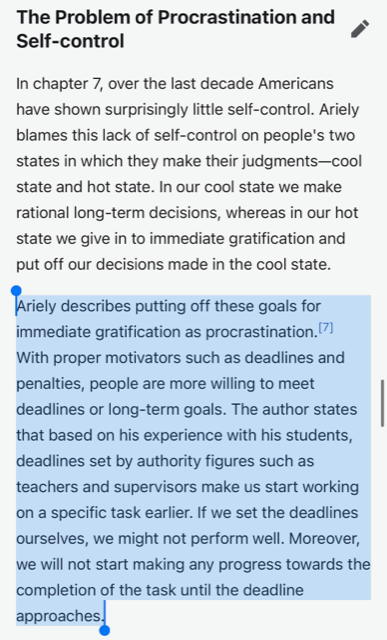Insights from 'Predictably Irrational': Enhancing Wealth Habits and Making Sound Financial Choices
Kane McGukin | August 15 2023
Recently a friend mentioned an excerpt from the book Predictably Irrational. While reading a few chapter summaries on Wikipedia there were several points that struck me to be helpful for both our investments and wealth habits.
Chapter 7: The Problem of Procrastination and Self-Control
The author, Dr. Dan Ariely, makes a critical point, one we've probably heard many times over. "Over the past decade, Americans have displayed a surprising lack of self-control."
He goes on to say that we do so because of two natural states we exist in, hot and cold. In our cool state, we make rational long-term decisions. In our hot state, we let our emotions take hold and make decisions based more on immediate gratification.
You can only imagine how social media can play into these two states.
It's not exactly shocking, but how can we apply this to our wealth?
Think about 2020 and 2021. During a period where most people were either full of fear or tired of being couped up, what did we resort to? Emotional investing!
For many, it became an easy avenue to legally gamble and feel okay with it, because it satisfied our emotions in the moment. So, at the first sign of short-term profits many "investors" threw their long-term plans out the window and became hotshot traders.
We all know how that gravy train ended... in a painful bear market that lasted close to two years. Additionally, for most of these newly found traders, it ended with a pile of tax losses, a lot of time guessing at news headlines, less money to spend on vacation, and a whole lot of heartburn.
How do we avoid these pitfalls?
First by recognizing when we're in hot and cold states. More importantly, as Ariely points out, knowing the importance of deadlines and authority.
What can we do with this information?
We can apply it to our wealth and the financial habits we practice. We can seek out authority figures in various parts of our financial lives and have them help us set boundaries, deadlines, and parameters that guide us to primary goals in our lives.
Take professional athletes for example. When they reach their peak. Do they have more or less coaches? Do they focus more or less on positive daily habits? Do they work harder and become more laser-focused on their goals, or do they put forth less effort?
By applying this logic, we will be better fitted to achieve what we desire. As an added bonus, we'll be able to shed a lot of the financial stress that sometimes comes with life.
Chapter 8: The High Price of Ownership
Ownership is something we all seek. However, it comes with a price most of us don't realize, and that price is understanding. We can't own what we don't understand.
Think about the first house you bought. Did you really understand all the time, effort, and cost that would go into those first few years? No. You probably thought homeownership was going to ease all of your pains because you were living the American Dream!
Many times if we look back it's our lack of understanding that leads to our irrational decisions that don't look so costly in the moment, though we find out the real consequence later down the road.
In Predictably Irrational, Dr. Ariely provides a few good points on why we irrationally overvalue ownership:
-
Ownership is such a big part of our society that we tend to focus on what we may lose rather than on what we may gain.
-
The connection we feel to the things we own makes it difficult for us to dispose of them.
-
We assume that people will see the transaction through our eyes.
In this chapter, Ariely highlights the significance of assuming ownership. More specifically, how does his emphasis on ownership relate to our financial decisions? It is crucial for us to take ownership not only in our financial lives but also in every aspect of our life, as it has an impact on everything we do and everyone we come across. Another great book on the topic is Extreme Ownership: How U.S. Navy Seals Lead and Win by Jocko Willink.
By taking control of our finances, we can diminish the perception of value and focus on diligently attending to foundational details. This approach leads to genuine ownership and allows our wealth to make a meaningful impact.
For more information browse Arkos Global's resources and blogs.
Disclaimer: Our intent in providing this material is purely for informational purposes, as of the date hereof, and may be subject to change without notice. This article does not intend to constitute accounting, legal, tax, or other professional advice. Visitors and readers should not act upon the content or information found here without first seeking appropriate advice from a trusted accountant, financial planner, lawyer or other professional.
Join us:









